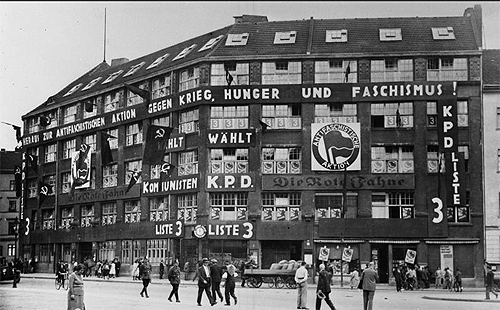
BERLIN — While pundits and news outlets the world over say the outcome of the Sept. 24 elections here has already been decided in favor of Germany’s chancellor, Angela Merkel, the country’s Left Party (Die Linke) begs to differ.
“The truth is that none of the important stuff has been decided,” Andreas Gunther, the head of Die Linke’s Department of International Policy, told People’s World in an interview yesterday in Berlin’s historic Karl-Liebknecht-Haus, the party’s national headquarters.
“What happens Sept. 24 depends heavily,” he said, “on how strong the Die Linke vote is.”
Merkel’s ruling Christian Democratic Union (CDU) is polling in the 35 percent range and the Social Democrats (SPD), who rule alongside them in a “Grand Coalition,” are polling in the low 20s. While those parties are indeed expected to come in first and second, respectively, the real fight is over who will become Germany’s main opposition party by placing third.
In the latest daily tracking polls, Die Linke is that party, with 11 percent, but the neo-Nazi Alternative for Germany party (AfD) is right on its heels with 10 percent. The main opposition party gets to answer and challenge the chancellor’s proposals in the Bundestag and a number of ministry appointments also go to that party.
Die Linke currently has 64 seats in the 600-member Bundestag while the AfD has none. If possible, Die Linke would like to keep it that way, or at least prevent the AfD from coming in third and taking on the role of the main opposition.
“We have a tough fight,” explained Gunther, “because we are the only party that does not have corporate support or backing from the moneyed interests.” He said that, in some ways, the ascendency of Donald Trump to the presidency in the United States makes life more difficult for Die Linke.
“Trump is so bad,” he said, “that he makes Angela Merkel look good. She appears as a reasonable social democratic type when compared to Trump.”
Gunther rejects, however, any idea that Merkel is now somehow the “leader of the free world,” as she is sometimes heralded to by some in the U.S. media.
“Merkel is the flag-holder for the big multinational corporations,” he said. “She defends their interests first and foremost. She sounds a little better because she is forced to. She had to enter a coalition with the Social Democrats to stay in power, so she has to at least sound progressive.”
Gunther was asked what it is about Die Linke that will attract enough voters to achieve its electoral goals next week.
“It’s our program,” he said. “We are for social fairness, disarmament, and for peace. We are clear about this and people can count on us to stick to this program. We fight hard to let people know that we will never accept a society where children grow up in poverty while the number of millionaires and billionaires is rising.”
Gunther said Die Linke is the only party that rejects Trump’s demand that Germany drastically increase its military spending. “We resolutely oppose this and will not accept austerity in exchange for doubling what the government wants us to spend on the military.”
Gunther said there are two big differences between Die Linke and all the other parties that he believes will help it attract voters.
“One is that we will never, like all the other parties, form a coalition with the chancellor. And the other is that we oppose war. Voters know that they have to vote for us if they want to pull all German soldiers back from abroad. We want to spend the money saved on the refurbishment of schools. No German troops abroad, not even as part of NATO, or the UN, or anything else!”

Two floors below Gunther’s office, campaign workers were busy clipping together posters and organizing bundles of leaflets outlining Die Linke’s 2017 election program, including higher pensions, unemployment benefits, better wages, higher taxes on the rich, improved healthcare, and the withdrawal of German troops from Afghanistan and elsewhere.
It’s the kind of activity that went on in Karl-Liebknecht-Haus in the 1920s and 30s as well when it served as the headquarters of the Communist Party of Germany (KPD), then the country’s third largest party. Named after Karl Liebknecht, the KPD leader assassinated by military death squads in 1919, the building was constructed originally as a factory but served as the KPD’s central offices in the years before fascism. It was the site of the last mass anti-Nazi demonstration just five days before Hitler came to power. Today, the activists inside are still engaged in the struggle.
Vera Vordenbaumen was making and receiving calls from a desk in the office. She was talking to people in women’s organizations who were planning a demonstration in Berlin this weekend.
“The right to life movement, with the backing of AfD, is planning an anti-abortion demonstration in Berlin tomorrow,” she explained to People’s World when she put down the phone. “We want to be there to join a counter-protest against them. We will have the opportunity to show that Die Linke stands with the women of this country for reproductive rights and economic equality.”










